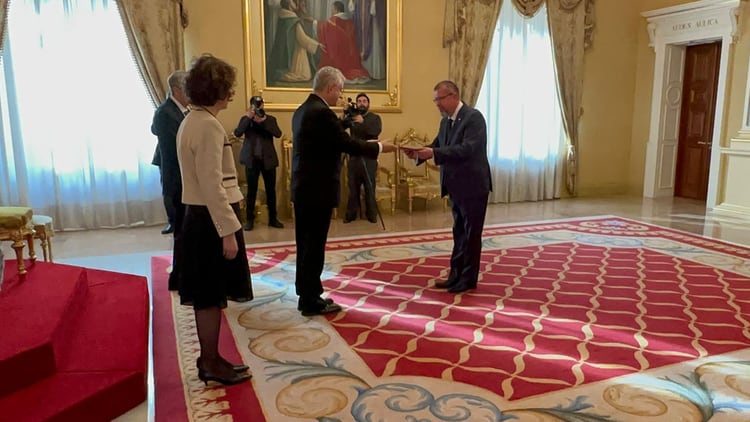Luis Ayllon
The Ambassador of the Russian Federation in Spain, Yuri Klimenko, yesterday presented his Credentials to the King, in a ceremony that took place in the Zarzuela Palace and not in the Royal Palace as usual.
Klimenko, who arrived in Madrid on December 19 last year to replace Yuri Korchagin in the post and presented his Style Copies a day later at the Ministry of Foreign Affairs, was, since then, waiting to be able to hand over the Credentials to the Head of State, and thus officially begin his mission in Spain.
The delivery of the Credentials to the Monarch was made known by the Russian Embassy and by the Spanish Ministry of Foreign Affairs, through its social networks, and had different characteristics from those that are usually customary in this ceremony.
The Government considered that the current circumstances, when the invasion of Ukraine by Russia continues, made it inadvisable for the Ambassador to present the Letters of Credence at the Royal Palace and with the ceremony attached to it, which includes the transfer in a period carriage from the headquarters of the Foreign Ministry at the Palace of Santa Cruz.
Normally, the presentation of Letters of Credence is carried out in groups of six or seven ambassadors, respecting the order of arrival in our country. The last ceremony was last January 23 and, at this moment, there are at least five ambassadors who have already handed in their Style Copies at the Ministry of Foreign Affairs and who have arrived after the Russian representative. These are the ambassadors of Nicaragua, Venezuela, New Zealand, Kazakhstan and El Salvador.
However, the Executive considered that it was preferable for Klimenko to present his Letters of Credence alone and not together with other ambassadors, as usual. The website of the Royal Household did not report on the ceremony nor did it provide any photographs. Neither did the Ministry of Foreign Affairs and the Embassy itself, whose web page does show a photograph of the presentation of Letters of Credence to the Archbishop of Urgell and Co-Prince of Andorra, Monsignor Joan-Enric Vives Sicília, since Klimenko is also accredited to the Principality.
The Minister of Foreign Affairs, José Manuel Albares, was present at the event. Despite The Diplomat’s questions, the Ministry did not inform whether, after the delivery of the Letters of Credence, Don Felipe spoke with Klimenko, as is the usual practice in the presentation of the Letters of Credence by the ambassadors.
Sources from the Ministry of Foreign Affairs explained that Spain, like most of its partners and allies, still maintains diplomatic relations with the Russian Federation at the level of Ambassadors, “both to protect our nationals in Russia,” they said, “and to have open channels of communication in defense of Spanish interests”.
The Ambassador, in his Twitter account, expressed his satisfaction for having been able to hand over his accreditation to the King and added: “I will continue working for the strengthening of the friendship between the Russian and Spanish peoples, now as Ambassador”.
Yuri Klimenko was already stationed in Spain between 2000 and 2004 when he was Minister Counselor of the Russian Embassy in Madrid and from 2012 to 2019, at the head of the Consulate General of Russia in Barcelona.
The eight years that separate those two destinations, between 2004 and 2012 he was deputy director of the First European Department of the Russian Foreign Ministry, a position he returned to at the end of his stay in Barcelona and which was the one he held until his appointment as ambassador. This is the department that deals with the affairs of Spain and other European countries.






